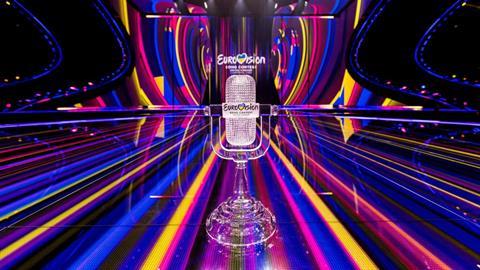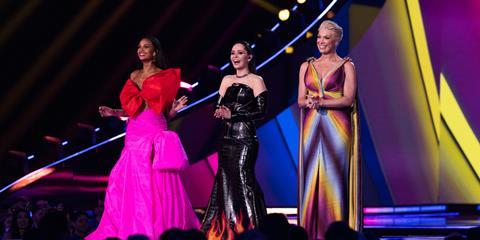dock10 studio manager Adam Balcombe reveals the facility’s work as a production base for the BBC’s transmission

The Eurovision Song Contest is always a hit with UK viewers, but the fact it was hosted in the UK on behalf of Ukraine this year really captured viewers’ attention.
A record 9.9 million viewers (and a peak of 11 million) tuned into the live broadcast of the Eurovision final on the BBC to watch Sweden’s Loreen triumph at the Liverpool Arena.
Here at dock10, we were proud to play a part once again in delivering the high-profile show to UK viewers.
The facility was the production base for the BBC’s transmission of both the semi-finals and the grand final. Everything that UK viewers saw on their screens from Eurovision – from the two semi-finals to the finals – passed through our Salford facility before airing on the BBC.
We first became the broadcast base for the BBC’s coverage of Eurovision last year when the competition was held in Turin. This year, we built on that experience for the very special Eurovision edition from Liverpool.
For the semis and the final, the European Broadcasting Union (EBU) provided us with the host Eurovision feed from Liverpool which was delivered via an EBU fibre. For back up, we also had three satellite feeds.
All these feeds were initially received by BBC Master Control Room (MCR) where the Dolby E stream was decoded to six channels of 5.1 audio and then delivered to dock10 via existing BBC infrastructure.
Also coming into the gallery were the contributions from our UK commentators in Liverpool - Scott Mills and Rylan for the semis and Graham Norton and Mel Giedroyc for the final. These were brought in via a Riedel SIP system and audio circuits from BBC MCR and married up with the incoming vision.

For the BBC broadcast, we also added UK-specific graphics to the host feed, including the UK phone numbers so viewers could vote.
Many of the acts made extensive use of flashing lights which can adversely affect some viewers. The host team onsite went to great lengths to mitigate any potential issues, however during the dress rehearsal stage we also ran a Harding test (to check for photosensitive epilepsy (PSE) provocative image sequences) – and then added visual and audible warnings before the necessary performances on the night.
Among other challenges, the BBC broadcasts the contest in 5.1 surround sound. It’s an enhancement on stereo, but that comes with added complexities. We ensured the coherency of the 5.1 audio stems throughout the broadcast chain but also monitored the stereo downmix so that the vast majority of people who watched in stereo at home had a high-quality experience.
Sometimes I’m asked whether it is stressful for the dock10 team to deliver such major live event. Of course, you are always nervous on the night; the team is aware it is a massive show and how much Eurovision means to UK viewers. It helps, though, that we have plenty of experience to draw on. At dock10, we work on some of TV’s biggest live events – from Euro 2020 and the Tokyo Olympics, through to Children In Need and Comic Relief.
Looking back on delivering this year’s Eurovision, there are plenty of things that stick in the mind beyond the contest’s catchy tunes and some of the outrageous staging and costumes (I’m thinking of those Croatian outfits). This was an extraordinary Eurovision, the first time that it has been delivered by one country on behalf of another. The way the city of Liverpool embraced Ukraine was both remarkable - and very moving.

Adam Balcombe is studio manager at dock10.







No comments yet